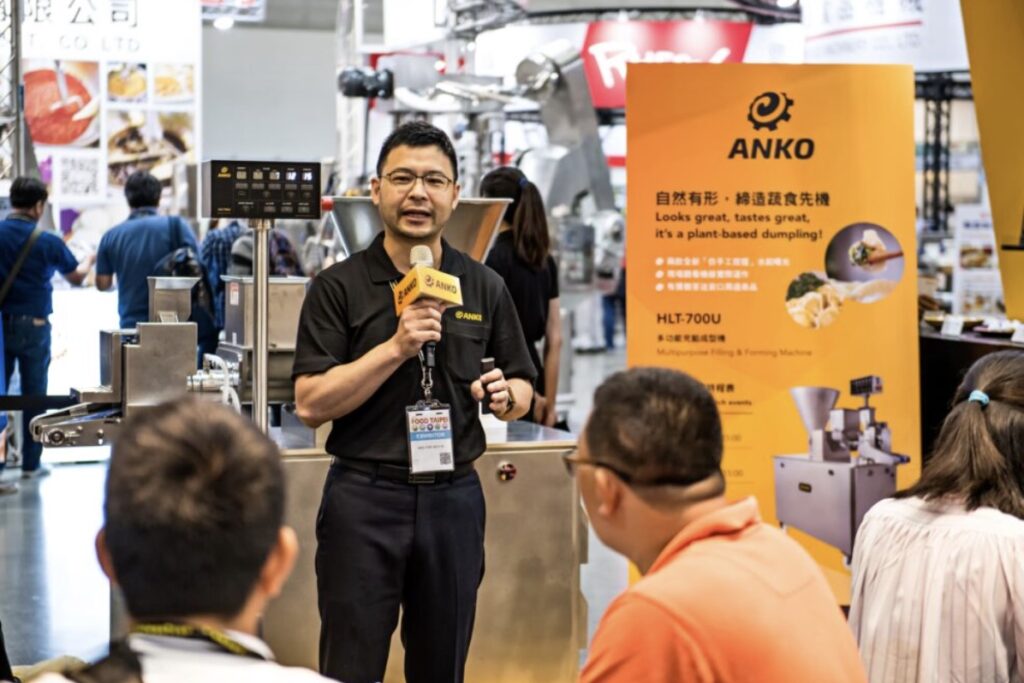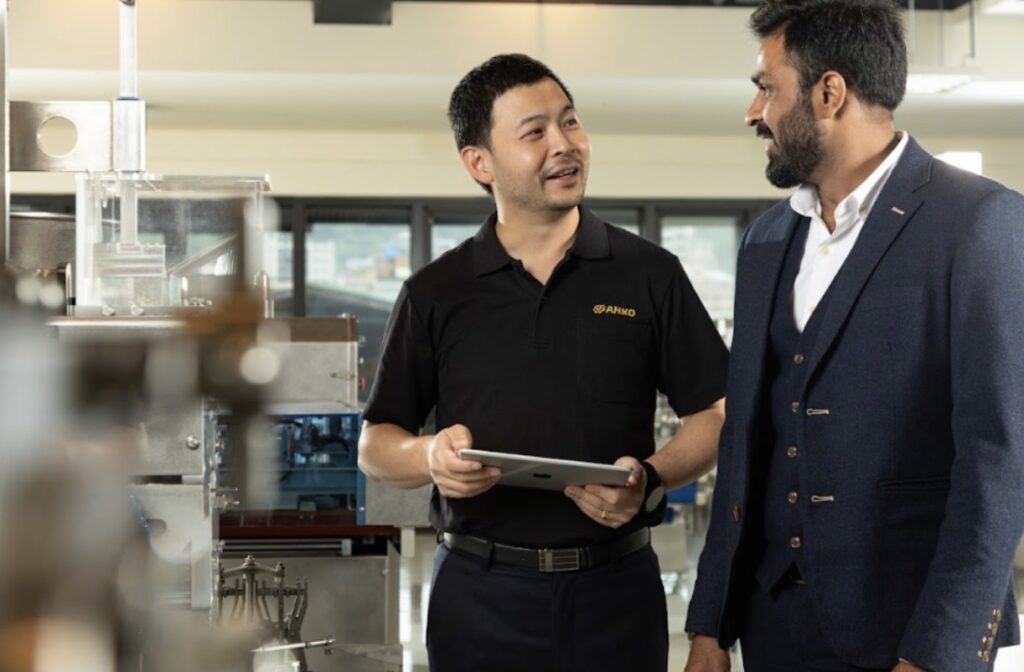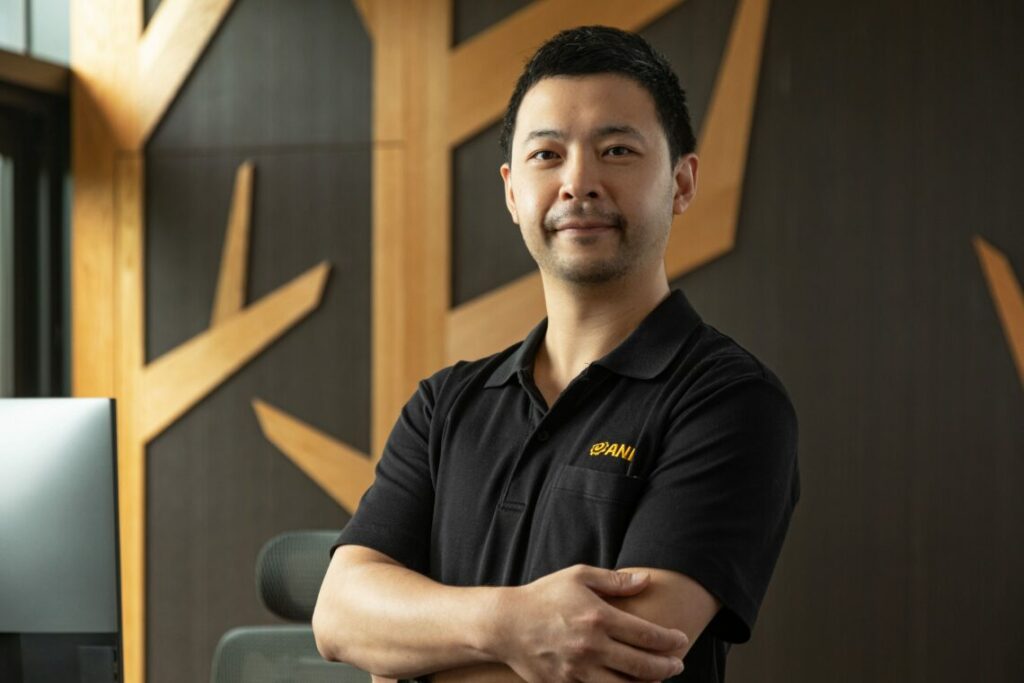In his eyes, the first step towards the future is to first “believe” in your heart:
“First ‘believe,’ and then you will ‘see.’ Everything will fall into place. I believe that the first step must start from the belief in the heart!” Richard Ouyang , General Manager of ANKO Food Machine Corporation and Vice Chairman of the Taiwan Digital Enterprise Association, emphasized in an interview with “The Icons” by Eken International Celebrity Magazine that contemporary businesses are undergoing “digital transformation” and “zero-carbon transformation,” and the leaders’ hearts must first “believe.”
After obtaining a master’s degree in mechanical engineering from the University of California, Los Angeles, Richard Ouyang returned to the family business, initially establishing a research and development department and gradually building a research and development system. After assuming the position of vice general manager, he further expanded the factory to its current scale. Richard Ouyang has been serving as the general manager since 2014, leading ANKO Food Machine Corporation in continuous transformation and reaching new peaks.
Established in 1978, ANKO Food Machine Corporation is a leading brand in Taiwan’s food processing industry, primarily focused on the export market. Its service extends to all five continents, with sales covering 112 countries, and it can produce over 300 types of foods from around the world. Now, the baton has been passed to Richard Ouyang . With his approachable management style, Richard Ouyang leads the company through multiple upgrades in line with the trends of the times.
“Many people talk about ‘results,’ but I prefer ‘belief.’ Like the ‘digital transformation train’ advocated by the Digital Enterprise Association, it helps everyone see the direction of sustainable transformation in the future. I often tell everyone that if you believe you can achieve it, you will definitely become that way because all your thoughts and practices will help you reach that place!” Richard Ouyang , also serving as Vice Chairman of the Taiwan Digital Enterprise Association, plays a leading role in the “digital transformation train,” guiding new-generation entrepreneurial members to bring the resources of the association back to their respective enterprises, allowing everyone to continue iterating and moving towards sustainability on the existing foundation.

Common Concern for Businesses: How to Effectively “Reduce Carbon”?
“Get on board!” Richard Ouyang , one of the conductors of the “digital transformation train,” also bears the responsibility of leading everyone to think as a team. “We not only look at the success of companies but also discuss the little details in ‘failed experiences,’ as these are more effective nutrients. We reach consensus with the visited companies, and everyone delves into your ‘dark history’! Because the challenges these exemplary companies faced during their growth are undoubtedly the best lessons for successors to learn effective transformation,” Richard Ouyang chuckled.
In addition to the collaborative learning of the “digital transformation train,” Richard Ouyang mentioned that the advisory team, composed of industry experts, is also a crucial driver assisting members in the sustainable transformation of the Taiwan Digital Enterprise Association. These experts are retired executives from various businesses, each with years of experience in promoting transformation in their respective fields. When members encounter any issues in their transformation journey, they can consult these seasoned experts for solutions. “In the ‘zero-carbon university’ of the Digital Enterprise Association, the experts not only impart knowledge and concepts but also directly point out specific systematic methods, providing each participant with a starting point for sustainable transformation.”
As early as 2014, before Richard Ouyang took over as general manager, ANKO Food Machine Corporation had already initiated “digital transformation.” However, like many other businesses, the next steps for “zero-carbon transformation” were perplexing at that time: “Carbon reduction is crucial, so we conducted carbon footprint assessments. But after that, how do we effectively reduce carbon? Back then, we knew the facts but didn’t understand the underlying reasons.” However, the empowerment from the Taiwan Digital Enterprise Association helped ANKO Food Machine Corporation initiate “zero-carbon transformation” based on its existing foundation: “For example, many people, after conducting greenhouse gas inventories, directly calculate carbon footprints. But regarding how to effectively reduce carbon next, there was no clear direction. Should it start from materials, design, or processes? Actually, the first thing to do is establish an energy management system, so you can understand how much carbon is generated throughout the operation process, including identifying the highest energy-consuming areas. Then, you’ll understand where to start reducing carbon most efficiently.”
The members of the Taiwan Digital Enterprise Association are leaders in various industries, making it an effective platform for resource integration and sharing. “Previously, to calculate how much electricity a certain machine consumes, we needed to install a smart meter. Fengyi Electronics happened to be our member, so I made a call to Shaoling Chen, the Chief Strategy Officer, and they helped us develop the smart meter. Now, besides ANKO, many members also use their products. Because we are all on the same path, and they have the capability in this area, they developed the smart electricity meter themselves and shared the information with us, so we all started using it together.'” Richard Ouyang said that facing the rapidly changing international market, group collaboration is inevitable. The Taiwan Digital Enterprise Association allows entrepreneurs to learn and create together, enabling the rapid convergence of resources from different fields. Many seemingly challenging problems can be solved in an instant.
Establishing a Firm Footing in the International Market through Transformation
“The challenges we face now are completely different from what the older generation encountered,” Richard Ouyang discusses the challenges faced by different generations in managing businesses and emphasizes the importance of successors addressing the issue of “transformation.”
“My father’s challenges back then were ‘where are the customers?’ His daily concern was how to travel the world with a suitcase and find customers willing to make purchases in various countries. In the current era of transparent information through the internet, we don’t need to fly to different places every day to knock on the doors of local customers. Still, we must learn a lot of non-core knowledge, including everything in the realm of ‘sustainable transformation,'” he added.
Richard Ouyang , skilled in international business, also mentioned that due to easy access to information in the internet age, customers and agents from various countries often use data from different competitors for bargaining and negotiations. The imitation of competitors and the increasing number of competitors in recent years prompted him to gradually adjust the company’s sales service model and product types.
“In terms of services, we use digital capabilities to accelerate and optimize the delivery process. Through digital transformation, we change the service provider model to meet more customer production needs, such as machine lifespan prediction. On the product side, we have advanced from a single machine to providing comprehensive solutions with both software (food formulas) and hardware, as well as rapid custom product services,” Richard Ouyang said. Elevating the value and completeness of solutions, offering customers products and services at different levels, is a differentiation strategy that demonstrates a unique position in the international market.
Richard Ouyang also mentioned that the mentors of the Taiwan Digital Enterprise Association have diverse international experiences, allowing entrepreneurs to quickly adjust their organizations, implement processes, and incorporate system tools during the digital transformation process, reducing various costs associated with transformation. He emphasized that these experienced mentors can even guide entrepreneurs in managing cross-border businesses.

Facing Internal Skepticism, “Mass Communication” is the Only Way
In the past, ANKO Food Machine Corporation only needed to focus on the field of food machinery. However, in the era where carbon has value, if a company does not actively reduce carbon, it will inevitably struggle to penetrate the international market. “In the past, if there was something I didn’t understand, I asked customers, agents, and senior colleagues. I roughly understood it. But entering this era where ‘digital transformation’ and ‘zero-carbon transformation’ are suddenly emphasized, no one in the company knew how to do it, and we didn’t even know where to ask. Looking back now, everything started with me believing that this thing would succeed, and then I started seeking resources.”
During the transformation, challenges from various aspects, including internal skepticism, are inevitable. Richard Ouyang emphasized that extensive communication is key: “You must communicate extensively with internal employees, continuously emphasizing the value of change. In the actual execution and operation process, you must let the team feel that everyone continues to achieve small successes. These experiences and achievements will provide partners with tangible evidence, instilling confidence in them. This way, the overall transformation of the company will proceed smoothly.”
Building upon the market foundation developed by the first generation, Richard Ouyang also mentioned that one of the key goals of sustainable transformation for ANKO Food Machine Corporation is to enhance after-sales service: “Digital tools can improve the efficiency of communication with customers. For example, if I sell a dumpling machine that can produce twelve thousand dumplings in an hour, and each dumpling earns one pound, then for the customer, stopping the machine for an hour means losing twelve thousand pounds. ‘Digital transformation’ can help customers minimize this loss.”
In addition, digital tools can also be used to monitor the health of food machinery, such as predicting when consumables need replacement or when any parts require maintenance, allowing early detection without the need for elaborate repairs sent back to the factory. Richard Ouyang joked, “The best after-sales service is not needing after-sales service.”
As for “zero-carbon transformation,” Richard Ouyang mentioned that when considering the purchase cost of a machine, it’s not just the equipment price; it also includes the cost of carbon tariffs, the carbon emissions during the transportation process, maintenance costs, and more. Therefore, what ANKO sells is not only the efficiency of the machine. According to Richard Ouyang , their value also includes helping customers minimize usage costs from the initiation of the machine to the end of its life cycle.
He believes that whether a company, after “zero-carbon transformation,” can bring the maximum value to customers, helping them complete the last mile and earn maximum profit at the lowest cost, is the greatest value a company can offer.
The First Step to Successful Sustainable Transformation is to “Believe”!
“Believe, and you will see” is the belief that Richard Ouyang has upheld all along. In addition to carrying forward the spirit of ANKO Food Machine Corporation – “Preserving the Taste Heritage, Manufacturing the First Choice” – allowing delicious flavours from ancient times to the latest to be preserved worldwide and assisting customers in creating more value, he also aspires for the team he leads to become a model for the “digital transformation” and “zero-carbon transformation” in the food processing industry. This, in turn, would lead the entire industry through transformation, creating more “common good” and “mutual success.”
“Of course, businesses need to be profitable, but I hope for the company, employees, suppliers, and customers to grow together, influencing the entire community, industry chain, and even this era,” Richard Ouyang enthusiastically extends an invitation to more entrepreneurs.
“The Digital Enterprise Association’s ‘digital transformation train’ is speeding along. Everyone is welcome to board. In this journey of sustainable transformation, we are a group traveling together. You won’t be alone; the conductor is right beside you! I can be reached anytime, but there’s one condition,” Richard Ouyang laughs and says, “You must join me; you must first ‘believe.’ As long as you believe, you will ‘see’!”

Business Transformation Institute is Now Enrolling
Business Transformation Institute, a transformation amplifier designed for Taiwanese enterprises, aims to integrate tradition and innovation to help businesses find new growth dynamics at critical moments of succession and transformation.
This place encourages new-generation entrepreneurs to accumulate experience and resources through internal and external entrepreneurship, while also facilitating the introduction of funds and resources to support the fusion and vigorous development of “first-generation” and “second-generation” entrepreneurs. Through this model, the institute not only serves as a growth platform for new-generation entrepreneurs but also acts as an amplifier for innovative thinking, guiding businesses to find their unique path of transformation amid change.
Recommend for you:
Navigating Sustainable Transformation! Catherine Huang, Sustainability Director of Victor Taichung of Taiwan, Chairperson of TDEA: Persist in Doing the Right Things, Leading the New Generation of Entrepreneurs to Transform Fundamentally
Is the Global ESG Standard a Mess? TXA Private Board Secretary General Steve Hsu: Become the “Market Definer”!